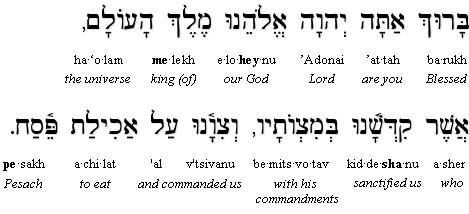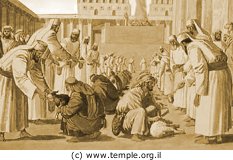|
The Pesach offering was lifted up for all gathered to see and the question, "Why do we eat this Pesach offering?" was asked. Everyone present would retell the story of the Exodus from Egypt and also partake of the matzah and maror.
Jesus' last Passover began a week before the Festival actually began (see John 12:1-33). After visiting his friend Lazarus and his sisters in Bethany, He went to Jerusalem just before the city became filled with pilgrims coming to celebrate the holiday. On the 10th of Nisan He entered the city, riding on a donkey to announce His messiahship (this was the time the korban Pesach was being selected for the sacrifice).
On the 10th of Nisan He entered the city, riding on a donkey to announce His Messiahship (this was the time the korban Pesach was being selected for the sacrifice). He was greeting with exclamations, "Baruch habah b'shem Adonai" - Blessed is he who comes in the Name of the Lord (Mark 11:9-10). Examined for four days before His sacrifice (execution) for the sins of the world, He was found to be the true Lamb of God (seh haElohim) without spot or blemish.
Like the original Passover in Egypt, the sacrifice of the Lamb causes the wrath of God to "pass over" those who are trusting in the LORD's provision for redemption, but in the case of the sacrifice of the Mashiach Yeshua, the everlasting Son of God, this redemption delivers us from the cruel bondage of Satan and causes the everlasting wrath of God to forever be put away from us. Indeed, Jesus is the Lamb of God who takes away the sins of the world!
|



